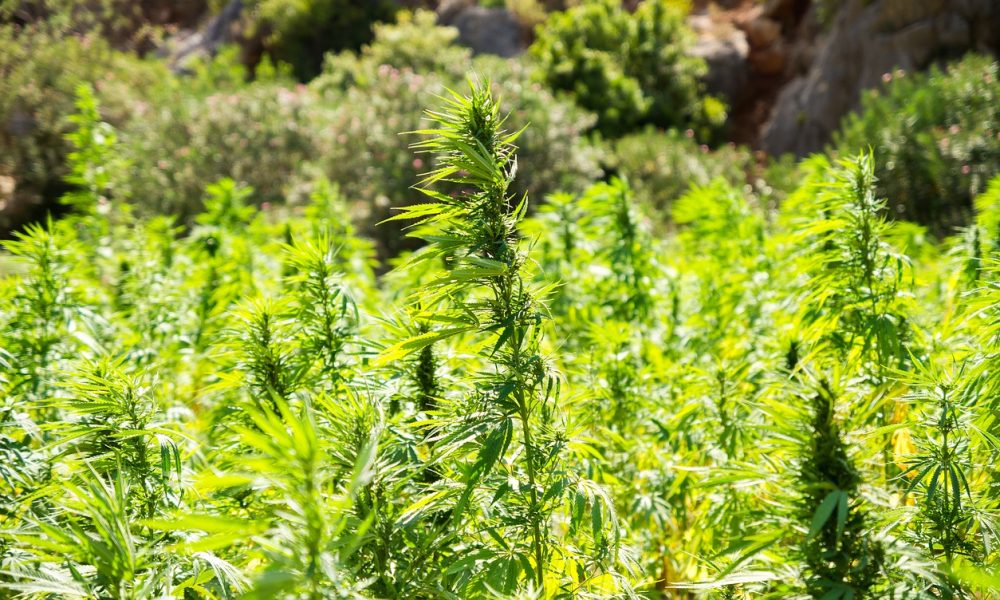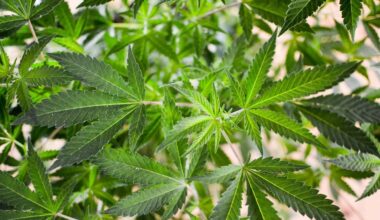A top Maryland lawmaker has pre-filed a bill to put marijuana legalization on the state’s 2022 ballot.
The text of the legislation from Del. Luke Clippinger (D)—who serves as chairman of a cannabis workgroup that’s been studying the issue—was posted online on Wednesday.
The bill, which seeks to put a constitutional amendment on the ballot, has been designated House Bill 1, signaling that it will be prioritized. It’s set to be formally introduced at the start of next year’s session on January 12 and has been referred to the Judiciary Committee, which Clippinger also chairs.
House Speaker Adrienne Jones (D) has been working to get the legislature in a good position to advance the reform quickly, announcing the formation of a cannabis workgroup this summer and stating that lawmakers “will pass legislation early next year” to refer the question of legalization to voters.
If passed in the legislature, the following question would go on the November ballot: “Do you favor the legalization of adult–use cannabis in the State of Maryland?” If approved, it would then be up to lawmakers to develop rules permitting the “use, distribution, possession, regulation, and taxation of cannabis within the state.”
—
Marijuana Moment is already tracking more than 1,300 cannabis, psychedelics and drug policy bills in state legislatures and Congress this year. Patreon supporters pledging at least $25/month get access to our interactive maps, charts and hearing calendar so they don’t miss any developments.![]()
Learn more about our marijuana bill tracker and become a supporter on Patreon to get access.
—
While advocates have been pushing for cannabis reform, there are at least two components to this measure that are already facing pushback.
First, it sets an effective date for the legalization of simple possession about eight months after the election, July 1, 2023. Others states have moved much more quickly, including in New York where low-level possession was immediately legalized following the signing of the reform bill.
Second, it would not require the legislature to allow for home cultivation—a key provision that activists have included in a draft referendum that they hoped lawmakers would model.
“While we are grateful legislative leaders are prioritizing cannabis legalization in 2022, we are disappointed the pre-filed House referendum would continue the devastating war on cannabis for months after voters legalize cannabis,” Karen O’Keefe, director of state policies for the Marijuana Policy Project, told Marijuana Moment. “We strongly urge legislators to revise the proposal to legalize possession and home cultivation upon enactment.”
“We also urge the legislature to pass implementing legislation in 2022 to ensure racial justice is at the heart of legalization, and to allow for a more timely transition to a safe, regulated market,” she said.
Clippinger’s office did not immediately respond to Marijuana Moment’s request for comment about the newly released measure.
The bill’s text was made available on Wednesday, but it was first requested in August—before the House Cannabis Referendum and Legalization Workgroup had held any meetings. Members have been discussing a wide range of issues related to business licensing, expungement of prior convictions, criminal and traffic laws related to marijuana, social equity and cannabis tax policy.
In October, the workgroup held a meeting where a top federal drug official gave legislators some advice on legalization in anticipation of the referendum.
Senate President Bill Ferguson (D), meanwhile, said in July that the reform is “beyond past due” in the state— but he seemed reluctant to embrace a referendum process and instead wants to pass a bill to end cannabis prohibition sooner than next November.
Legalization legislation did start to advance through the legislature during the 2021 session, but no votes were ultimately held.
The Senate Finance Committee held a hearing in March on a legalization bill sponsored by Ferguson, the majority leader and key committee chairs. That followed a House Judiciary Committee hearing on a separate cannabis proposal in February.
Lawmakers had worked to reconcile the differences between the House and Senate proposals in the hopes of getting something to the desk of Gov. Larry Hogan (R), who has not endorsed legalization but has signaled he may be open to considering the idea.
As Maryland lawmakers considered the two marijuana legalization bills this past session, a poll found that the state’s residents are on board with the policy change. Two-thirds (67 percent) of Marylanders now back legalizing cannabis, according to a Goucher College survey. Just 28 percent are opposed.
Pressure to enact the reform is also building regionally. Marijuana legalization took effect in Virginia in July, for example.
Maryland legalized medical marijuana through an act of the legislature in 2012. Two years later, a decriminalization law took effect that replaced criminal penalties for possession of less than 10 grams with a civil fine of $100 to $500. Since then, however, a number of efforts to further marijuana reform have fallen short.
A bill last year to expand the decriminalization possession threshold to an ounce passed the House last year but was never taken up in the Senate.
Also last year, the governor vetoed a bill that would have shielded people with low-level cannabis convictions from having their records publicized on a state database. In a veto statement, he said it was because lawmakers failed to pass a separate, non-cannabis measure aimed at addressing violent crime.
In 2017, Hogan declined to respond to a question about whether voters should be able to decide the issue, but by mid-2018 he had signed a bill to expand the state’s medical marijuana system and said full legalization was worth considering: “At this point, I think it’s worth taking a look at,” he said at the time.
As for Maryland lawmakers, a House committee in 2019 held hearings on two bills that would have legalized marijuana. While those proposals didn’t pass, they encouraged many hesitant lawmakers to begin seriously considering the change.
Medical Disclaimer:
The information provided in these blog posts is intended for general informational and educational purposes only. It is not a substitute for professional medical advice, diagnosis, or treatment. Always seek the advice of your physician or other qualified healthcare provider with any questions you may have regarding a medical condition. The use of any information provided in these blog posts is solely at your own risk. The authors and the website do not recommend or endorse any specific products, treatments, or procedures mentioned. Reliance on any information in these blog posts is solely at your own discretion.







